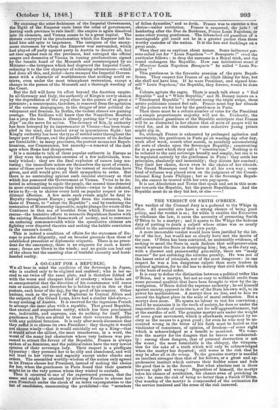A GO-CART FOR A REPUBLIC.
WE all bear in mind the condition of the Sovereign in Japan, who is exalted only to be slighted and snubbed ; who is too sa- cred to eat twice off the same plate, and is therefore fobbed off with the worst and cheapest kind of crockery ; whose looks are so omnipotential that the direction of his countenance will cause rain or sunshine, and therefore he is bidden to sit in this or that posture, each hour of the day, for the good of his country. Other nations, such as the people of Begharmi in Central Africa and the subjects of the Grand Lama, have had a similar idol-slave,- to say nothing of Austria. It is reserved for the ingenious French to attempt the same plan with a republic. That grand Republic, that eternal and stupendous entity, which has been proclaimed one, indivisible, and supreme, can do nothing for itself. The gentlemen in Paris are afraid to trust their venerated Republic with any political function. It is only after much discussion that they suffer it to choose its own President : they thought it would not choose wisely—that it would suicidally set up a King—that it would select the silliest, the most treacherous, in a word, the worst of the many bad characters whose very badness was pre- sumed to attract the favour a the Republic. France is always spoken of as feminine, and the political rakes have the very lowest opinion of their sovereign lady. Their respect is a profligate hypocrisy : they presume her to be silly and abandoned, and will not trust to her virtue and sagacity except under checks and orders. The assembled worldly-wisdom of the nation only agreed to let France choose her President, instead of making the choice for her, when the gentlemen in Paris found that their quarrels might let in the very person whom they wished to exclude.
Then it occurred to one of the experienced persons, that the same end might be attained by allowing France to choose her own President under the check of an index expurgatorius to the list of candidates, enumerating the prohibited—the "members of fallen dynasties," and so forth. France was to exercise a free choice—under restriction. France is suspected, the jade ! of hankering after the Due de Bordeaux, Prince Louis Napoleon, or some other young gentleman. The debauched old guardian of a marriageable girl could not be in a greater pucker than these worthy custodes of the nation. It is the hen and ducklings on a great scale.
Then they are so captious about names. Some indiscreet per- sons called out for "Louis Napoleon "—" Bonaparte !" cried the particular fellows : to drop the surname is a Royal trick, and the sound endangers the Republic. How can institutions stand if "Monsieur Louis Napoleon Bonaparte" be called "Louis Na- poleon"?
This gentleman is the favourite aversion of the pure Repub- licans. They suspect fair France of an illicit liking for him, but she shall not have him. If he were President, and signed him- self" Louis Napoleon," the Republic, they foresee, would be done for.
Colours agitate the sages. There is much talk about a "Red Republic" and a" White Republic," and M. Boussy insists on a "Tricoloured Republic ": without seeing the triple stripe, these astute politicians cannot feel safe. France must buy her ribands of the pattern set for her by the gentlemen in Paris. Then there must be a certain number of votes for the President —a simple proportionate majority will not do. Evidently, the self-constituted guardians of the Republic anticipate that France will be so distracted in her choice that all sorts of people will be voted for, and in the confusion some seductive young prince might slip in.
So, although France is exhausted by prolonged agitation and uncertainty, the gentlemen in Paris go on wasting day after day, week after week, month after month, in painfully accumulating all sorts of checks upon the Sovereign Republic ; constructing for it a go-cart which they call a "constitution." Nothing is to be referred to the said sovereign broadly and simply, but she is to be regulated entirely by the gentlemen in Paris : they settle her principles, absolutely and immutably ; they dictate her conduct ; they limit her choice, down even to the choice of her ribands. The Grand Monarque used to have it all his own way ; some kind of reliance was placed even on the judgment of the Consti- tutional King Louis Philippe ; but as to the Sovereign Repub- lic, she cannot be trusted with her own pap-spoon.
It is not Absolutists and Tories that speak and act in this man- ner towards the Republic, but the purest Republicans. And the Republic must do as they bid her, or else


























 Previous page
Previous page